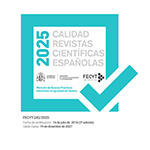Las nuevas formas de vivir en familia: el caso de las familias reconstituidas
Resumen
One of the features more visible in comparing the results of the (2001) last census in Spain with those of 1991 is the emergence of a new type of household structure: the reconstituted family composed by a couple with the children of a previous relation. The scientific interest of this type of family rests not only in the small number of anthropological studies done in Spain, but in the nature of the cultural changes represented by this new social data, the new claims derived from it, and the absence of social politics suitable to those situations. Those families symbolize a new social reality which is in a continuous process of experimentation and construction, without any referential tradition, and challenge the traditional concepts and way of thinking our cultural kinship system: marriage, filiation, family, home, residence, parenthood, maternity, paternity… This article presents a part of the results of an anthropological research on reconstituted families in Madrid Region financed by Labour and Social Affairs MinistryDescargas
##plugins.generic.pfl.publicationFactsTitle##
##plugins.generic.pfl.reviewerProfiles## N/D
##plugins.generic.pfl.authorStatements##
Indexado: {$indexList}
-
##plugins.generic.pfl.indexedList##
- ##plugins.generic.pfl.academicSociety##
- N/D
- Editora:
- Ediciones Complutense
Descarga artículo
Licencia
La revista Cuadernos de Relaciones Laborales, para fomentar el intercambio global del conocimiento, facilita el acceso sin restricciones a sus contenidos desde el momento de su publicación en la presente edición electrónica, y por eso es una revista de acceso abierto. Los originales publicados en esta revista son propiedad de la Universidad Complutense de Madrid y es obligatorio citar su procedencia en cualquier reproducción total o parcial. Todos los contenidos se distribuyen bajo una licencia de uso y distribución Creative Commons Reconocimiento 4.0 (CC BY 4.0). Esta circunstancia ha de hacerse constar expresamente de esta forma cuando sea necesario. Puede consultar la versión informativa y el texto legal de la licencia.











